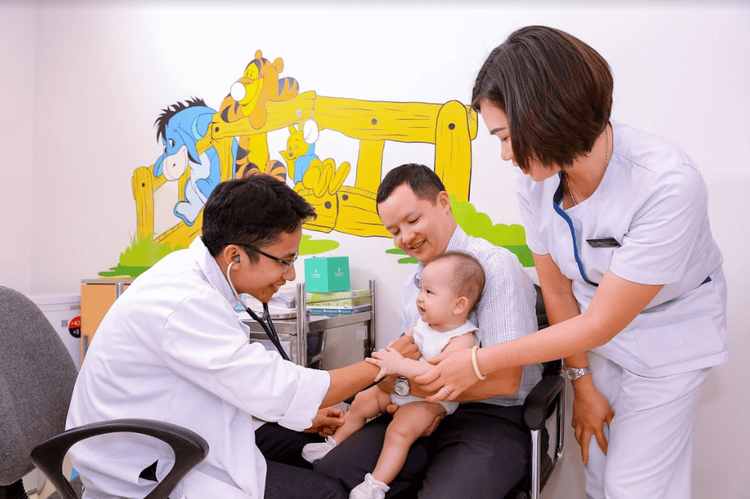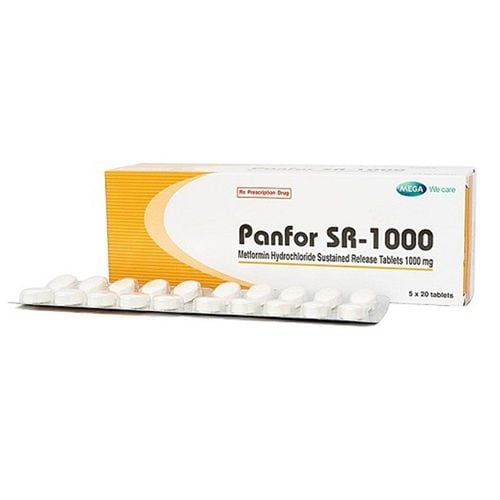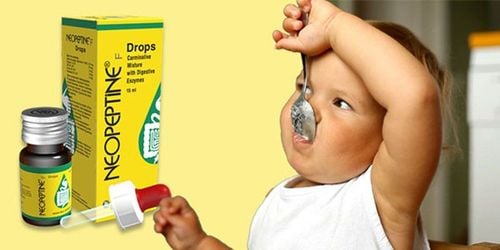This is an automatically translated article.
Nutrition for children in the first years of life has a very important role. Children need to be built a proper diet to meet the energy needs to help strengthen the body's resistance according to each stage of development in a scientific way to ensure comprehensive physical development. substance and intelligence.
1. When should you take your child to a nutritionist?
Experts recommend that the nutritional needs of the baby will change continuously according to each age, so parents should give the baby a regular check-up and nutritional counseling on a regular schedule for the baby's diet and exercise. be reasonably modified and adjusted.
During the first 1000 days of a baby's life, nutrition is extremely important because this is the stage of complete brain development and a solid step for the child's physical and mental development later on. . Therefore, parents should take their baby to a nutrition clinic at the milestones of 6, 9, 12, 15, 18 and 24 months old to check early for nutritional problems that disrupt the child's development.
After 24 months, parents should have their baby re-examined periodically 1 to 2 times. However, when there are signs such as: poor appetite, anorexia, weight loss, or unusually rapid weight gain.... Parents need to take their baby to a doctor soon for timely treatment.
2. Benefits of nutritional examination for children
Assess the nutritional status of the baby to promptly adjust the diet and exercise in the best way. Early detection and timely treatment of nutritional diseases can leave consequences for children's health in the future such as: malnutrition, stunting, overweight and obesity, vitamin and mineral deficiency... Nutritionists guide a reasonable, scientific diet, build an exercise regimen that brings necessary benefits to the baby's health as well as build a healthy lifestyle when the baby is an adult.

Khám dinh dưỡng cho trẻ giúp phát hiện sớm và điều trị kịp thời các bệnh lý dinh dưỡng
3. Subjects needing nutrition counseling
3.1. Advice for mothers and caregivers of children under 16 years of age: For nursing mothers: Need to know how to take care of their health, eat reasonable sources of nutrients to ensure a good source of milk for lactation. and know how to breastfeed. Know how to take care of your child's health so that he or she can grow up healthy and full. When the child is sick, the experts will guide how to take care of the child on each patient case. 3.2. Examination and counseling for children under 16 years old: treatment and dietary guidance. Baby is lazy, anorexic, has growth retardation, malnourishment and rickets. Lack of essential micronutrients: such as anemia, zinc deficiency, vitamin A and minerals deficiency. Overweight, obesity. Digestive disorders. Counseling and building for children of each age about diet.
4. Nutrition examination for babies
Through the nutritional examination, parents will know what nutrients their child is currently in excess or deficiency in, thereby making necessary and appropriate adjustments to each stage of the child's physical development. Based on the results of the examination and evaluation of the specialist doctor to make a reasonable appointment suitable for the baby. The process of nutritional examination for children is scientifically built from examination, diagnostic tests, and rations to menus for each individual.4.1. Assess nutritional status Measure height and weight for children. Put children on the Inbody machine to measure their body mass index and then analyze their body composition with the Inbody machine.

Đo chiều cao, cân nặng của trẻ để đánh giá tình trạng dinh dưỡng
4.2. Examination and consultation with a nutritionist General examination of the whole body. Exploit pathological symptoms to assess the nutritional status of children. Prescribe medication, instruct how to care, monitor the child during treatment to promptly make the right recommendations. 4.3. Laboratory - imaging To have a basis in accurate diagnosis and make reasonable decisions about highly effective treatment regimens. Nutritionists can do tests: blood count, blood biochemistry, micronutrient tests, ultrasound, X-ray... suitable for each child's pathology.
4.4. Moderation – Formulating a menu Exploiting 24h rations (required or depending on medical condition/target need); Learn about your baby's eating habits and preferences. Develop a menu according to the doctor's prescription, the child's preferences and eating habits. 4.5. Examination, consultation with a doctor Sports medicine - movement Check, evaluate and control the health status of musculoskeletal, . Assess the body's ability to exercise and exercise to give appropriate instructions and indications for children. Design appropriate exercise exercises; Guidance for parents, guidance for older children on movement advice, instructions on exercise and sports in accordance with the treatment regimen of nutritional pathologies. 4.6. Instructions for movement, exercise Instructions for performing exercises as prescribed by a doctor of Sports Medicine - Mobilization Guide, give documents for home workouts.
5. What to pay attention to when taking children to nutrition examination?
Nutrition examination for the baby is very necessary for the parents of the child, helping the parents to have appropriate care orientation according to each stage of the child's development. Here are the necessary notes for parents to prepare their baby for a nutritional examination in a thoughtful and complete way:
5.1. Know your baby's current symptoms and condition This is the most important note. Parents need to know clearly what problems the baby is having, what unusual manifestations are there... From there, the doctor can know how the baby is doing to give accurate diagnosis measures and reasonable solutions for treatment. properly.

Khám dinh dưỡng cho bé là việc làm rất cần thiết
5.2. Bring medical examination records When going for routine nutrition check-ups for children, parents bring along previously examined nutrition records so that the nutritionist can have a basis for examination and diagnosis, and at the same time make decisions. correct and appropriate.
You can bring along the child's previous examination records for the doctor to see and have an accurate diagnosis, saving time and unnecessary testing costs.
5.3. Remember the baby's diet and living habits During the last 1 month, 1 week, parents should fully and accurately record information about their baby's meals including complementary foods. baby (food, drink), quantity and frequency of feeding, feeding time,... In addition to recording information about diet, besides indicators of daily activities such as: sleep, entertainment, and movement of the baby during the day is also a good and necessary basis for experts to provide a better treatment plan and nutritional care.
5.4. Taking the child to the doctor for re-examination on time When taking the child for examination and treatment, it is important to have the follow-up check-up on time and on time because it contributes to a more effective diagnosis and evaluation and is the basis for adjusting the treatment regimen. timely treatment. Therefore, parents need to remember the schedule of follow-up visits and take their children to the doctor on time. However, in case parents are busy with work and do not bring their children to the specialist's appointment, they can arrange to come earlier or come after 1 to 2 days for the specialist to examine and adjust the indications for the doctor. suitable for maximum therapeutic effect.
5.5. Parents should consider choosing reputable nutrition centers with experienced doctors and nutritionists as well as modern equipment and comprehensive procedures. , self-contained ... to ensure the effective treatment process, does not take much time and quickly achieves the goal.
Currently at Vinmec International General Hospital, there are general health checkup packages for babies.
In the health checkup package, your baby will be comprehensively examined, from eyes, teeth, blood pressure, weight to necessary tests, combined with imaging diagnosis and functional assessment. liver and kidney baseline, blood sugar, nutritional status and hepatitis B virus. The examination package helps you check your baby's overall health, screen for symptoms for early detection and treatment if needed.
For children to be healthy and develop well, it is necessary to have a nutritious diet in terms of quantity and quality balance. If children are not provided with adequate and balanced nutrients, it will lead to diseases of excess or lack of nutrients, which adversely affect the comprehensive development of children in terms of physical, mental and motor skills.
Children who do not eat properly are at risk of micro-mineral deficiency causing anorexia, growth retardation, malabsorption,... If they notice the above signs, parents should supplement their children with products. The supplement contains lysine, essential micro-minerals and vitamins such as zinc, chromium, selenium, and B vitamins to help fully meet the nutritional needs of children. At the same time, these essential vitamins also support digestion, enhance nutrient absorption, help improve anorexia, and help children eat well.
Parents can learn more:
Signs of zinc deficiency in children
Micronutrient deficiency and failure to gain weight in children
Please regularly visit Vinmec.com website and update useful information to take care of your child. Take care of the baby and the whole family.













